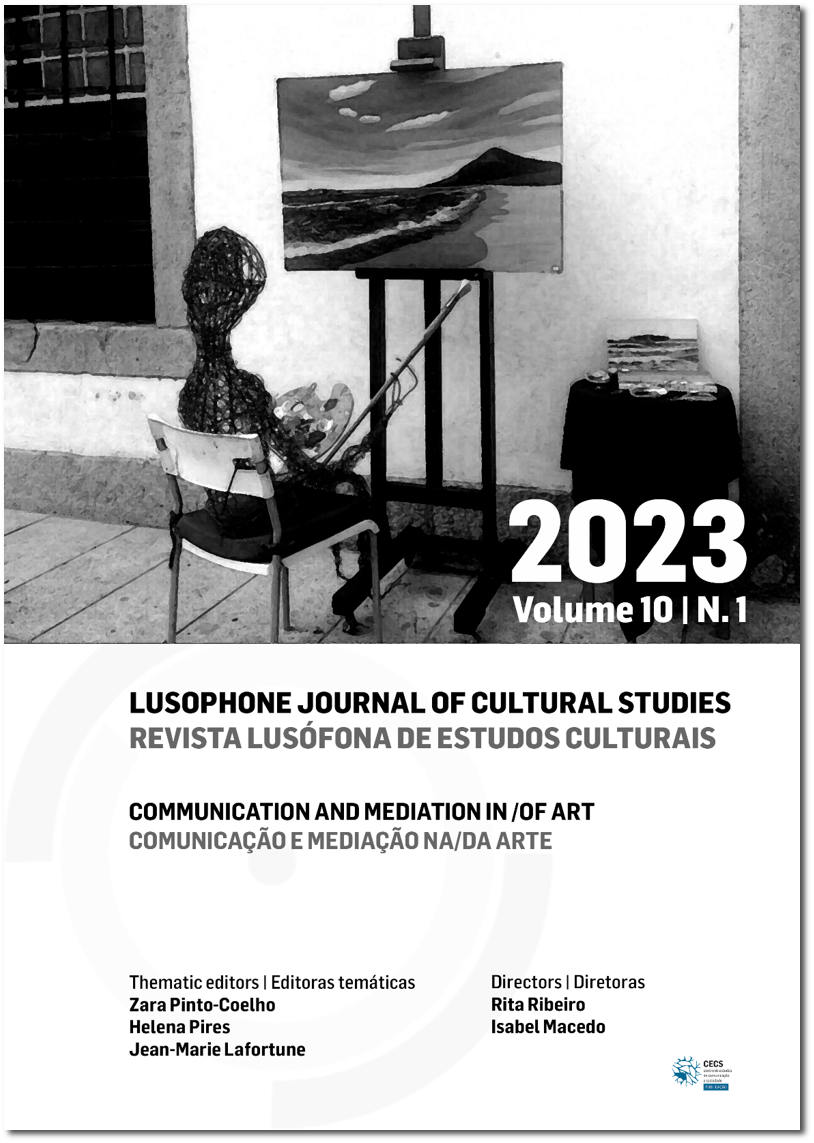The Mediating Possibilities of Art: A Case Study on Artistic Experience and Theatre Participation of People with Visual Impairment
DOI:
https://doi.org/10.21814/rlec.4465Keywords:
cultural mediation, artistic practice, disability, cultural participationAbstract
This article draws on the experience of implementing a project of inclusion through art — A Meu Ver (In My View) — by a professional artistic structure in theatre in the city of Coimbra: O Teatrão. It is a three-year theatre training and practice project for people with blindness or have low vision, funded by the Calouste Gulbenkian Foundation and La Caixa Foundation under the Partis & Art for Change programme. The project combines training and intervention in the cultural space of Coimbra. The aim was to analyse and rethink the possible roles of artistic education in cultural mediation, as an intervention model, between the entity O Teatrão and a group of disabled people, traditionally out of the artistic circuits. This research privileged a qualitative approach, conducting a case study of exploratory nature, which took place between October 2021 and August 2022. The data reported here were collected through four data collection techniques: participant observation, questionnaire survey, semi-structured interviews and focus group. By demonstrating the importance of the artistic creation experience in recomposing disabled people's identities, the project stimulates the deconstruction of disability conceptions based on the individual model and promotes a social concept of disability. In bringing together visually impaired people and Teatrão professionals, A Meu Ver demonstrates that the problems of disabled people do not derive from their impairments but from the dominant forms of social organisation and culture. This deconstruction made it possible to analyse the individual impacts of the project for its direct participants and to highlight possible cultural mediation formats for developing projects with this approach in the cultural sector.
Downloads
References
Ateca-Amestoy, V., & Villarroya, A. (2017). Measuring participation in the arts in Spain. In V. Ateca-Amestoy, V. Ginsburgh, I. Mazza, J. O'Hagan, & J. Prieto-Rodriguez (Eds), Enhancing participation in the arts in the EU (pp. 19–33). Springer. https://doi.org/10.1007/978-3-319-09096-2_2
Attride-Stirling J. (2001). Thematic networks: An analytic tool for qualitative research. Qualitative Research, 1(3), 385–405. https://doi.org/10.1177/146879410100100307
Austin, S., & Brophy, C. (2015). The creative case for inclusive arts practices. Literature Review. Arts Access Victoria.
Baltazar, B. D. C. (2021). Identidade em movimento: Identidade visual animada para o Teatrão [Dissertação de mestrado, Universidade de Coimbra]. Repositório Institucional da Universidade de Coimbra. https://eg.uc.pt/handle/10316/96038
Barnes, C., & Mercer, G. (2010). Exploring disability. Polity Press.
Becker, H. (1982). Art worlds. Berkeley e Los Angeles. University of California Press.
Braun V., & Clarke V. (2006). Using thematic analysis in psychology. Qualitative Research in Psychology, 3(2), 77–101.
Brown, A. S. (2004). The values study: Rediscovering the meaning and value of arts participation. Connecticut Commission on Culture and Tourism.
Brown, S. E. (1997). ‘Oh, don't you envy us our privileged lives?’ A review of the disability culture movement. Disability and Rehabilitation, 19(8), 339–349. https://doi.org/10.3109/09638289709166548
Convenção sobre os Direitos das Pessoas com Deficiência, 12 de dezembro de 2006, https://www.ministeriopublico.pt/instrumento/convencao-sobre-os-direitos-das-pessoas-com-deficiencia
Davallon, J. (2010). A mediação: A comunicação em processo? Prisma.com, (4), 4–37. https://ojs.letras.up.pt/index.php/prismacom/article/view/2100
Davis, L. J. (1995). Enforcing normalcy: Disability, deafness, and the body. Verso.
Fontes, F. (2019). Framing disability in Portugal: Historical processes and hegemonic narratives. In P. R. Martins, A. L. Semedo, & Camacho, C. F. (Eds.). Representing disability in museums. imaginary and identities (pp. 99–118). Centro de Investigação Transdisciplinar Cultura, Espaço e Memória.
Giddens, A. (1989). Sociology. Polity Press.
Instituto Nacional de Estatística, I.P. (2022). O que nos dizem os censos sobre as dificuldades sentidas pelas pessoas com incapacidades. INE. https://www.ine.pt/xurl/pub/6620037
Muñoz‐Bellerín, M., & Cordero‐Ramos, N. (2020). The role of applied theatre in social work: Creative interventions with homeless individuals. The British Journal of Social Work, 50(5), 1611–1629. https://doi.org/10.1093/bjsw/bcaa033
Muñoz‐Bellerín, M., & Cordero‐Ramos, N. (2021). Citizen art and human rights: Collective theatre creation as a way of combating exclusion. Social inclusion, 9(4), 1–10. https://doi.org/10.17645/si.v9i4.4372
Novak-Leonard, J. L., & Brown, A. S. (2011). Beyond attendance: A multi-modal understanding of arts participation (Research Report N.º 54). Art Works. https://www.arts.gov/sites/default/files/2008-SPPA-BeyondAttendance.pdf
Oliver, M., & Barnes, C. (1998). Disabled people and social policy: From exclusion to inclusion. Longman.
República Portuguesa. (2022). Estratégia de Promoção da Acessibilidade e da Inclusão dos Museus, Monumentos e Palácios na dependência da Direção-Geral do Património Cultural e das Direções Regionais de Cultura. https://www.inr.pt/documents/11309/465535/EPAI+estrat%C3%A9gia+de+promo%C3%A7%C3%A3o+da+acessibilidade+e+inclus%C3%A3o+MMPs/bf51fb93-e9e2-4126-aee9-d5d8320d7a02
Resolução do Conselho de Ministros n.º 119/2021, Diário da República n.º 169/2021, Série I de 2021-08-31 (2021). https://dre.pt/dre/detalhe/resolucao-conselho-ministros/119-2021-170514954
Swain, J., & French, S. (2000). Towards an affirmation model of disability. Disability & Society, 15(4), 569–582. https://doi.org/10.1080/09687590050058189
Teatrão. (s.d.). Sobre. Retirado a 10 de novembro de 2022 de https://oteatrao.com/sobre/
Tomka, G. (2013). Reconceptualizing cultural participation in Europe: Grey literature review. Cultural Trends, 22(3–4), 259–264. https://doi.org/10.1080/09548963.2013.819657
Vlachou, M., & Acesso Cultura. (2020). A participação cultural de pessoas com deficiência ou incapacidade. Como criar um plano de acessibilidade. Câmara Municipal de Lisboa. https://acessoculturapt.files.wordpress.com/2020/10/manual_plano-de-acessibilidade.pdf
Wendell, S. (1996). The rejected body: Feminist philosophical perspectives on disability. Routledge.
Downloads
Published
How to Cite
Issue
Section
License
Copyright (c) 2023 Cláudia Carvalho, Fernando Fontes, Susete Margarido

This work is licensed under a Creative Commons Attribution 4.0 International License.
Authors own the copyright, providing the journal with the right of first publication. The work is licensed under a Creative Commons - Atribuição 4.0 Internacional License.








